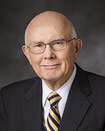The Importance of Families
-
•
Why did our Heavenly Father send us to earth as members of families?
“Marriage
between a man and a woman is ordained of God. … The family is central
to the Creator’s plan for the eternal destiny of His children” (“The
Family: A Proclamation to the World,” Ensign, Nov. 1995, 102).
After Heavenly Father brought Adam and Eve together in marriage, He commanded them to have children (see Genesis 1:28).
He has revealed that one of the purposes of marriage is to provide
mortal bodies for His spirit children. Parents are partners with our
Heavenly Father. He wants each of His spirit children to receive a
physical body and to experience earth life. When a man and a woman bring
children into this world, they help our Heavenly Father carry out His
plan.
Every
new child should be welcomed into the family with gladness. Each is a
child of God. We should take time to enjoy our children, to play with
them, and to teach them.
President
David O. McKay said, “With all my heart I believe that the best place
to prepare for … eternal life is in the home” (“Blueprint for Family
Living,” Improvement Era, Apr. 1963, 252). At home, with our
families, we can learn self-control, sacrifice, loyalty, and the value
of work. We can learn to love, to share, and to serve one another.
Fathers
and mothers are responsible to teach their children about Heavenly
Father. They should show by example that they love Him because they keep
His commandments. Parents should also teach their children to pray and
to obey the commandments (see Proverbs 22:6).
-
•
Why is the home the best place to prepare for eternal life?
-
•
How can we help the youth of the Church understand the sacredness of the family and the marriage covenant?
The Eternal Family
Families
can be together forever. To enjoy this blessing we must be married in
the temple. When people are married outside the temple, the marriage
ends when one of the partners dies. When we are married in the temple by
the authority of the Melchizedek Priesthood, we are married for time
and eternity. If we keep our covenants with the Lord, our families will
be united eternally as husband, wife, and children. Death cannot
separate us.
Loving Family Relationships
-
•
How can we develop greater harmony in our homes?
Husbands
and wives should be thoughtful and kind to each other. They should
never do or say anything to hurt each other’s feelings. They should also
try to do everything possible to make each other happy.
As parents come to know God and strive to be like Him, they will teach children to love one another. In the Book of Mormon, King Benjamin explained:
“Ye will not suffer your children … [to] fight and quarrel one with another. …
“But
ye will teach them to walk in the ways of truth and soberness; ye will
teach them to love one another, and to serve one another” (Mosiah 4:14–15).
As
family members we can help each other feel confident by giving
encouragement and sincere praise. Each child should feel important.
Parents need to show they are interested in what their children do and
express love and concern for their children. Children should likewise
show their love for their parents. They should be obedient and try to
live the kind of life that will bring honor to their parents and to
their family name.
-
•
What can parents do to encourage their sons and daughters
to be good friends with one another? What can brothers and sisters do
to nurture their friendship with one another?
-
•
What can husbands and wives do to help each other be happy?
How to Have a Successful Family
-
•
What are you doing to help strengthen your family and make it successful?
President
Harold B. Lee taught, “The most important of the Lord’s work you will
ever do will be within the walls of your own homes” (Teachings of Presidents of the Church: Harold B. Lee [2000], 134).
Satan
knows how important families are to our Heavenly Father’s plan. He
seeks to destroy them by keeping us from drawing near to the Lord. He
will tempt us to do things that will draw our families apart.
The
First Presidency and Quorum of the Twelve Apostles declared,
“Successful marriages and families are established and maintained on
principles of faith, prayer, repentance, forgiveness, respect, love,
compassion, work, and wholesome recreational activities” (Ensign, Nov. 1995, 102).
All of us want to have happy, successful families. The following things will help us achieve this:
-
1.
Have family prayer every night and morning (see 3 Nephi 18:21). Pray together as husband and wife.
-
2.
Teach children the gospel every week in family home evening.
-
3.
Study the scriptures regularly as a family.
-
4.
Do things together as a family, such as work projects, outings, and decision making.
-
5.
Learn to be kind, patient, long-suffering, and charitable (see Moroni 7:45–48).
-
6.
Attend Church meetings regularly (see D&C 59:9–10).
-
7.
Follow the counsel of the Lord in D&C 88:119:
“Organize yourselves; prepare every needful thing; and establish a
house, even a house of prayer, a house of fasting, a house of faith, a
house of learning, a house of glory, a house of order, a house of God.”
-
8.
Keep a family history, perform temple work together, and receive the sealing ordinances of the temple.
The family is the most important unit in The Church of Jesus Christ
of Latter-day Saints. The Church exists to help families gain eternal
blessings and exaltation. The organizations and programs within the
Church are designed to strengthen us individually and help us live as
families forever.
-
•
What can families do to work through difficult times?
-
•
What evidence have you seen that efforts such as family
prayer, family scripture study, family councils, family meal times, and
family home evening make a difference?
Additional Scriptures and Other Sources
-
•
Moses 2:27–28 (man and woman created and blessed)
-
•
Genesis 2:24 (man to cleave unto his wife)
-
•
D&C 49:15–16 (God ordained marriage)
-
•
Ephesians 6:4 (train children in righteousness)
-
•
D&C 132:15–21 (eternal marriage)
-
•
D&C 88:119–26 (instructions for a successful family)
-
•
D&C 93:40–50 (the Lord commands parents to bring up their children in light and truth)
-
•
“The Family: A Proclamation to the World” (available on LDS.org and in many Church publications, including Ensign, Nov. 1995, page 102; For the Strength of Youth: Fulfilling Our Duty to God [item number 36550], page 44; and True to the Faith: A Gospel Reference [item number 36863], pages 59–61)
**To Visit The Blog, Visit The Following (And New) Web-Address: ** HTTP://THEVINEYARDOFTHEPLAINVIEWWARD.BLOGSPOT.COM * Attention Friends: Many Of You Get This Via E-Mail; I Encourage You To Visit The Actual Blog For Additional Interactive Features Such As Videos (And Many Of The Blog Entries Have Videos That Are Not Supported Through Email), News Alerts, (For Those In Plainview Branch) Lesson Schedules, Cleaning Schedules, Announcements And Much More. Find Interactive Links To Many Church Websites.

